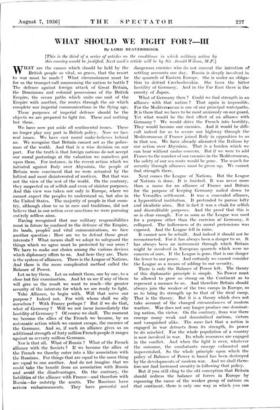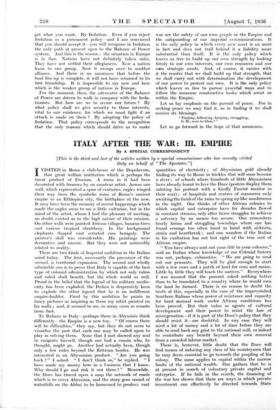WHAT SHOULD WE FIGHT FOR ?
By LORD BEAVERBROOK
[This is the third of a series of articles on the conditions in which military action by this country would be justified. Next week's article will be by Sir Arnold Wilson, M.P.] WHAT are the causes which should be held by the British people so vital, so grave, that the resort to war must be made ? What circumstances must be for us the trumpet-call summoning the nation to battle ? The defence against foreign attack of Great Britain, the Dominions and colonial possessions of the British Empire, the ocean paths which unite one unit of the Empire with another, the routes through the air which complete our imperial communications in the flying age. These purposes of imperial defence should be the objects we are prepared to fight for. These and nothing but these.
We have now put aside all sentimental issues. These no longer play any part in British policy. Now we face real issues. We have cast moral make-believes behind us. We recognise that Britain cannot act as the police- man of the world. And that is a wise decision on our part. For the truth is that foreign nations do not accept our moral posturings at the valuation we ourselves put upon them. For instance, in the recent action which we initiated against Italy over Abyssinia, the people of Britain were convinced that we were actuated by the loftiest and most disinterested of motives. But that was not the view of the rest of the world. On the contrary, they suspected us of selfish and even of sinister purposes. And this view was taken not only in Europe, where we cannot expect the peoples to understand us, but also in the United States. The majority of people in that coun- try, although close to us in race and traditions, did not believe that in our action over sanctions we were pursuing entirely selfless aims.
Having recognised that our military responsibilities must in future be confined to the defence of the Empire, its lands, peoples._ and vital communications, we face another question : How are we to defend those great interests ? What means shall we adopt to safeguard the things which we agree must be protected by our arms ?
We have to make our choice among the various devices which diplomacy offers to us. And here they are. There is the system of alliances. There is the League of Nations. And there is the more complicated method called the Balance of Power.
Let us try them. Let us submit them, one by one, to a close but fair examination. And let us see if any of them will give us the result we want to reach—the greater security of the interests for which we are ready to fight. Take Alliance, to begin with. Will that serve our purpose ? Indeed not. For with whom shall we ally ourselves ? With France perhaps ? But if we do that, what of Germany ? Will we not incur immediately the hostility of Germany ? Of course we shall. The moment we become the allies of the French we become, by an automatic action which we cannot escape, the enemies of the Germans. And so, if such an affiance gives us an additional strength of forty million French people it ranges against us seventy million Germans.
Nor is that all. What of Russia ? What of the French alliance with the Soviets ? If we become the allies of the French we thereby enter into a like association with the Russians. For things that are equal to the same thing are equal to one another. And do not imagine that we could take the benefit from an association with Russia and avoid the disadvantages. On the contrary, the liabilities of the alliance with France—and therefore with Russia—far outstrip the assets. The Russians have serious embarrassments. They have powerful and dangerous enemies who do not conceal the intention of settling accounts one day. Russia is deeply involved in the quarrels of Eastern Europe. She is under an obliga- tion to defend Czechoslovakia. She faces the bitter hostility of Germany. And in the Far East there is the enmity of Japan.
What of Germany then ? Could we find strength in an alliance with that nation ? That again is impossible.
For the Mediterranean is one of our principal waterpaths. It is there that we have to be most anxiously on our guard. Yet what would be the first effect of an alliance with Germany ? We would drive the French into hostility. They would become our enemies. And it would be diffi- cult indeed for us to secure our highway through the Mediterranean if France joined Italy in opposition to us in that sea. We have already alienated the Italians by our action over Abyssinia. That is a burden which we can bear without undue concern. But if we were to add France to the number of our enemies in the Mediterranean, the safety of our sea route would be gone. The search for security through alliances must be given up. We cannot find strength there.
Next comes the League of Nations. But the League of Nations is done. It is finished. It was never more than a name for an alliance of France and Britain for the purpose of keeping Germany nailed down to the Versailles settlement. It was a concealed alliance, a hypocritical institution. It pretended to pursue lofty and idealistic aims. But in fact it was a cloak for selfish and discreditable purposes. And the proof that this is so is clear enough. For as soon as the League was used for a purpose other than the coercion of Germany, it collapsed. The hollowness of its moral pretensions was exposed. And the League fell in ruins.
It cannot now be rebuilt. And indeed it should not be reconstructed. For it has always been a danger to us. It has always been an instrument through which Britain might be involved in European quarrels which were no concern of ours. If the League is gone, that is one danger the fewer to our peace. And certainly we cannot consider the League as a means of adding to our security.
There is only the Balance of Power left. The theory of this diplomatic principle is simple. No Power must be allowed to grow so strong on the Continent as to represent a menace to us. And therefore Britain should always join the weaker of the two camps in Europe, so as to bring its strength up to that of the rival camp.
That is the theory. But it is a theory which does not take account of the changed circumstances of modern warfare. War does not any longer produce one dominat- ing nation, the victor. On the contrary, from war there emerge many weak and demoralised nations, victors and vanquished alike. The mere fact that a nation is engaged in war detracts from its strength, its power to do mischief. For the whole population of a country is now involved in war. Its whole resources are engaged in the conflict. And when the fight is over, whatever the outcome, the combatants emerge exhausted and impoverished. So the whole principle upon which the policy of Balance of Power is based has been destroyed by the developments of modern war. And we shall there- fore not find increased security in following that policy.
But if you still cling to the old conception that Britain should redress the balance of forces in Europe by espousing the Cause of the weaker group of nations on that continent, there is only one way in which you can get what you want. By Isolation. Even if you reject Isolation as a permanent policy—and I am convinced that you should accept it—you will recognise in Isolation the only path at present open to the Balance of Power system. And this is the reason : the situation in Europe is in flux. Nations have not definitely taken sides. They have not settled their allegiances. Now a nation leans to one group. Now it swings over to another alliance. And there is no assurance that before the final line-up is complete, it will not have returned to its first friendship. It is impossible to say now and here which is the weaker group of nations in Europe.
For the moment, then, the advocates of the Balance of Power are driven to walk in company with the Isola- tionists. But how are we to secure our future ? By what policy shall we give security to those interests, vital to our existence, for which we must fight if an attack is made on them ? By adopting the policy of Isolation. That policy corresponds to the recognition that the only reasons which should drive us to make war are the safety of otir,own people in the Empire and the safeguarding of our imperial ccminunications. It is the only policy in which every new asset is an asset in fact and does not trail behind it a liability more substantial than itself. It is the . only policy which leaves us free to build up our own strength by looking firmly to our own interests, our own resources and our own strategic needs. And, of course, it carries with it the resolve that we shall build up that strength, that we shall carry out with determination the development of our power to protect our own. It is the only policy which leaves us free to pursue peaceful ways and to follow the immense constructive tasks which await us within the Empire.
Let us lay emphasis on the pursuit of peace. For in seeking peace we may find it, as in finding it we shall receive its blessings.
"Finding, following, keeping, struggling, Is 113 sure to bless ? "
Let us go forward in the hope of that assurance.







































 Previous page
Previous page